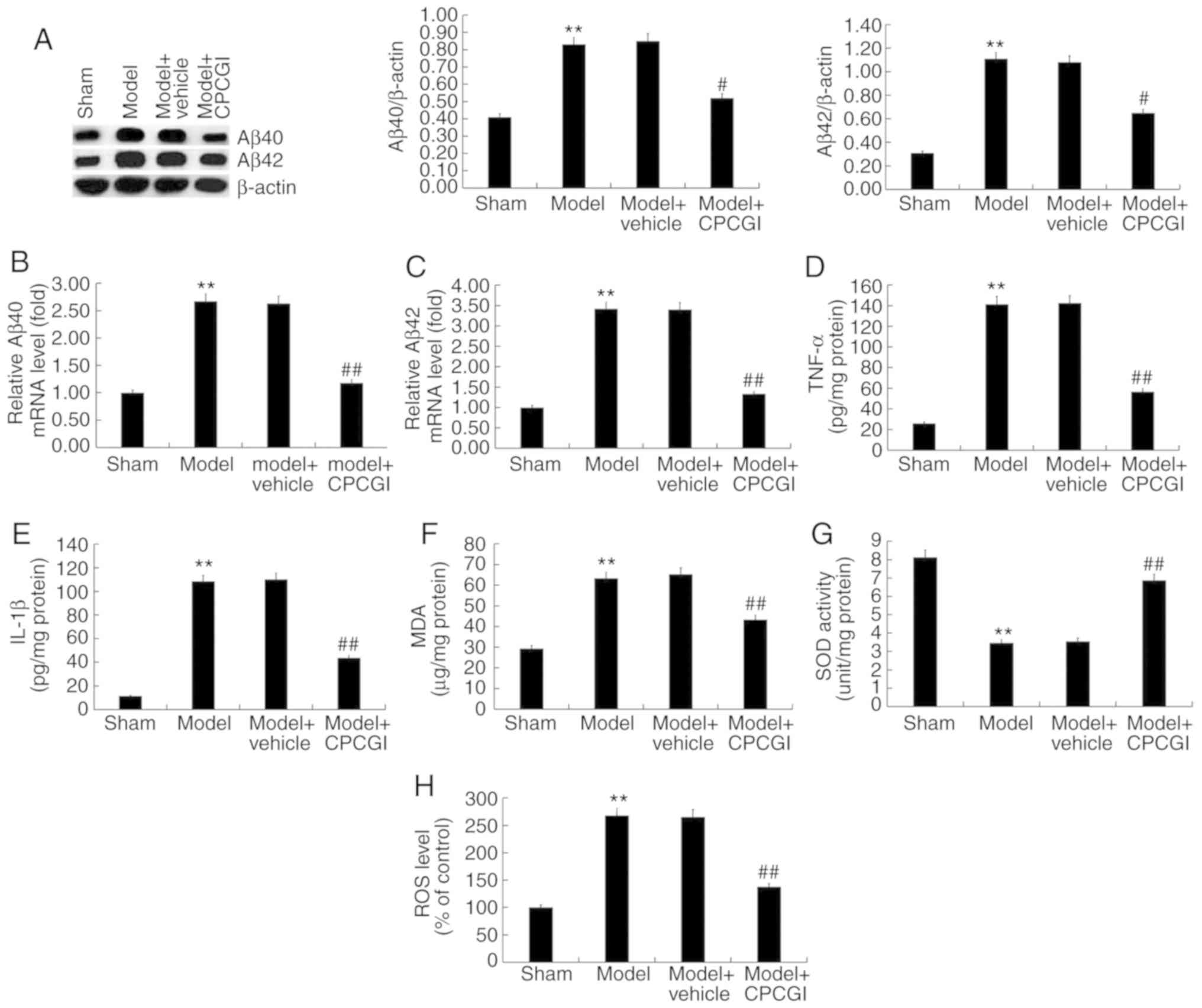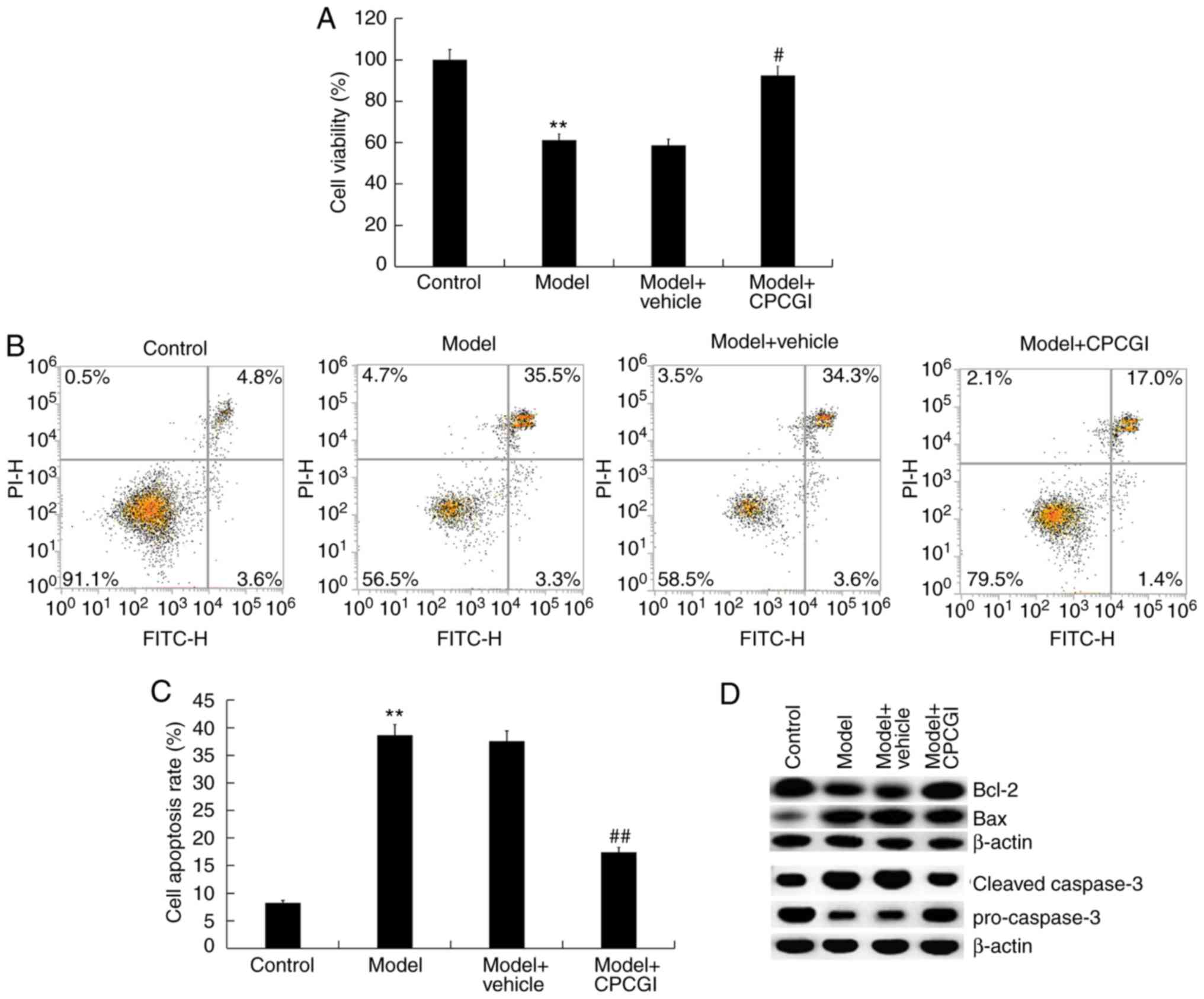|
1
|
Selkoe DJ: Alzheimer's disease: Genes,
proteins, and therapy. Physiol Rev. 81:741–766. 2001. View Article : Google Scholar : PubMed/NCBI
|
|
2
|
Dubois B, Feldman HH, Jacova C, Dekosky
ST, Barberger-Gateau P, Cummings J, Delacourte A, Galasko D,
Gauthier S, Jicha G, et al: Research criteria for the diagnosis of
Alzheimer's disease: Revising the NINCDS-ADRDA criteria. Lancet
Neurol. 6:734–746. 2007. View Article : Google Scholar : PubMed/NCBI
|
|
3
|
Kang J, Lemaire HG, Unterbeck A, Salbaum
JM, Masters CL, Grzeschik KH, Multhaup G, Beyreuther K and
Müller-Hill B: The precursor of Alzheimer's disease amyloid A4
protein resembles a cell-surface receptor. Nature. 325:733–736.
1987. View
Article : Google Scholar : PubMed/NCBI
|
|
4
|
Glenner GG and Wong CW: Alzheimer's
disease: Initial report of the purification and characterization of
a novel cerebrovascular amyloid protein. Biochem Biophys Res
Commun. 120:885–890. 1984. View Article : Google Scholar : PubMed/NCBI
|
|
5
|
Lane CA, Hardy J and Schott JM:
Alzheimer's disease. Eur J Neurol. 25:59–70. 2018. View Article : Google Scholar : PubMed/NCBI
|
|
6
|
Frost PS, Barros-Aragão F, da Silva RT,
Venancio A, Matias I, Lyra E Silva NM, Kincheski GC,
Pimentel-Coelho PM, De Felice FG, Gomes FCA, et al: Neonatal
infection leads to increased susceptibility to Aβ oligomer-induced
brain inflammation, synapse loss and cognitive impairment in mice.
Cell Death Dis. 10:3232019. View Article : Google Scholar : PubMed/NCBI
|
|
7
|
Blennow K, Leon MJD and Zetterberg H:
Alzheimer's disease. Lancet. 368:387–403. 2006. View Article : Google Scholar : PubMed/NCBI
|
|
8
|
Ballard C, Gauthier S, Corbett A, Brayne
C, Aarsland D and Jones E: Alzheimer's disease. Lancet.
377:1019–1031. 2011. View Article : Google Scholar : PubMed/NCBI
|
|
9
|
Teng E, Taylor K, Bilousova T, Weiland D,
Pham T, Zuo X, Yang F, Chen PP, Glabe CG, Takacs A, et al: Dietary
DHA supplementation in an APP/PS1 transgenic rat model of AD
reduces behavioral and Aβ pathology and modulates Aβ
oligomerization. Neurobiol Dis. 552–560. 2015. View Article : Google Scholar : PubMed/NCBI
|
|
10
|
Wang M, Zhang Y, Feng L, Zheng J, Fan S,
Liu J, Yang N, Liu Y and Zuo P: Compound porcine cerebroside and
ganglioside injection attenuates cerebral ischemia-reperfusion
injury in rats by targeting multiple cellular processes.
Neuropsychiatr Dis Treat. 13:927–935. 2017. View Article : Google Scholar : PubMed/NCBI
|
|
11
|
Wang M, Feng L, Fan S, Zheng JI, LI DM,
Yang N, Zuo P and Liu Y: Effect of Compound porcine cerebroside and
ganglioside injection on cerebral ischemia-reperfusion injury in
rats. Chin J Rehabil Theory Prac. 281–285. 2016.
|
|
12
|
Kwak DH, Kim SM, Lee DH, Kim JS, Kim SM,
Lee SU, Jung KY, Seo BB and Choo YK: Differential expression
patterns of gangliosides in the ischemic cerebral cortex produced
by middle cerebral artery occlusion. Mol Cells. 20:354–360.
2005.PubMed/NCBI
|
|
13
|
Zamfir AD: Neurological analyses: Focus on
gangliosides and mass spectrometry. Adv Exp Med Biol. 806:153–204.
2014. View Article : Google Scholar : PubMed/NCBI
|
|
14
|
Huang XF, Wang JM, Chen Q, Wei YY and Chen
HW: Meta-analysis on effect of compound Danshen injection in
treating neonatal hypoxic-ischemic encephalopathy. Zhongguo Zhong
Yao Za Zhi. 40:141–148. 2015.(In Chinese). PubMed/NCBI
|
|
15
|
Wang H, Jiang HQ, Li J, et al: Clinical
study of Compound Porcine Cerebroside and Ganglioside Injection on
Alzheimer disease. Chinese Community doctors. 12:127–128. 2010.(In
Chinese).
|
|
16
|
Bayne K: Revised guide for the care and
use of laboratory animals available. American physiological
society. Physiologist. 39(199): 208–211. 1996.
|
|
17
|
Amani M, Shokouhi G and Salari AA:
Minocycline prevents the development of depression-like behavior
and hippocampal inflammation in a rat model of Alzheimer's disease.
Psychopharmacology (Berl). 236:1281–1292. 2018. View Article : Google Scholar : PubMed/NCBI
|
|
18
|
Garcez ML, Mina F, Bellettini-Santos T,
Carneiro FG, Luz AP, Schiavo GL, Andrighetti MS, Scheid MG, Bolfe
RP and Budni J: Minocycline reduces inflammatory parameters in the
brain structures and serum and reverses memory impairment caused by
the administration of amyloid β (1–42) in mice. Prog
Neuropsychopharmacology Biol Psychiatry. 77:23–31. 2017. View Article : Google Scholar
|
|
19
|
Cioanca O, Hritcu L, Mihasan M, Trifan A
and Hancianu M: Inhalation of coriander volatile oil increased
anxiolytic-antidepressant-like behaviors and decreased oxidative
status in beta-amyloid (1–42) rat model of Alzheimer's disease.
Physiol Behav. 131:68–74. 2014. View Article : Google Scholar : PubMed/NCBI
|
|
20
|
Sharifi AM and Mousavi SH: Studying the
effects of lead on DNA fragmentation and proapoptotic bax and
antiapoptotic Bcl-2 protein expression in PC12 cells. Toxicol Mech
Methods. 18:55–79. 2008. View Article : Google Scholar
|
|
21
|
Lee S, Youn K, Kim DH, Ahn MR, Yoon E, Kim
OY and Jun M: Anti-neuroinflammatory property of phlorotannins from
Ecklonia cava on Aβ25-35-induced damage in PC12
cells. Mar Drugs. 17:E72018. View Article : Google Scholar : PubMed/NCBI
|
|
22
|
Livak KJ and Schmittgen TD: Analysis of
relative gene expression data using real-time quantitative PCR and
the 2(-Delta Delta C(T)) method. Methods. 25:402–408. 2001.
View Article : Google Scholar : PubMed/NCBI
|
|
23
|
Balin BJ and Hudson AP: Etiology and
pathogenesis of late-onset Alzheimer's disease. Curr Allergy Asthma
Rep. 14:4172014. View Article : Google Scholar : PubMed/NCBI
|
|
24
|
Area-Gomez E and Schon EA: On the
pathogenesis of Alzheimer's disease: The MAM hypothesis. FASEB J.
31:864–867. 2017. View Article : Google Scholar : PubMed/NCBI
|
|
25
|
Bolós M, Perea JR and Avila J: Alzheimer's
disease as an inflammatory disease. Biomol Concepts. 8:37–43. 2017.
View Article : Google Scholar : PubMed/NCBI
|
|
26
|
Nazıroğlu M, Muhamad S and Pecze L:
Nanoparticles as potential clinical therapeutic agents in
Alzheimer's disease: Focus on selenium nanoparticles. Expert Rev
Clin Pharmacol. 10:773–782. 2017. View Article : Google Scholar : PubMed/NCBI
|
|
27
|
Dastan Z, Pouramir M, Ghasemi-Kasman M,
Ghasemzadeh Z, Dadgar M, Gol M, Ashrafpour M, Pourghasem M,
Moghadamnia AA and Khafri S: Arbutin reduces cognitive deficit and
oxidative stress in animal model of Alzheimer's disease. Int J
Neurosci. 129:1145–1153. 2019. View Article : Google Scholar : PubMed/NCBI
|
|
28
|
Faux NG, Ellis KA, Porter L, Fowler CJ,
Laws SM, Martins RN, Pertile KK, Rembach A, Rowe CC, Rumble RL, et
al: Homocysteine, vitamin B12, and folic acid levels in Alzheimer's
disease, mild cognitive impairment, and healthy elderly: Baseline
characteristics in subjects of the Australian imaging biomarker
lifestyle study. J Alzheimers Dis. 27:909–922. 2011. View Article : Google Scholar : PubMed/NCBI
|
|
29
|
Connelly PJ, Prentice NP, Cousland G and
Bonham J: A randomised double-blind placebo-controlled trial of
folic acid supplementation of cholinesterase inhibitors in
Alzheimer's disease. Int J Geriatr Psychiatry. 23:155–160. 2010.
View Article : Google Scholar
|
|
30
|
Chen H, Liu S, Ji L, Wu T, Ji Y, Zhou Y,
Zheng M, Zhang M, Xu W and Huang G: Folic acid supplementation
mitigates Alzheimer's disease by reducing inflammation: A
randomized controlled trial. Mediators Inflamm. 2016:59121462016.
View Article : Google Scholar : PubMed/NCBI
|
|
31
|
Kou S, Zheng Q, Wang Y, Zhao H, Zhang Q,
Li M, Qi F, Fang L, Liu L, Ouyang J, et al: Zuo-Gui and You-Gui
pills, two traditional Chinese herbal formulas, downregulated the
expression of NogoA, NgR, and RhoA in rats with experimental
autoimmune encephalomyelitis. J Ethnopharmacol. 158:102–112. 2014.
View Article : Google Scholar : PubMed/NCBI
|
|
32
|
Wang YZ, Kou S, Gu LY, Zheng Q, Li M, Qi
F, Zhao H and Wang L: Effects of Zuogui Pill () and Yougui Pill ()
on the expression of brain-derived neurotrophic factor and cyclic
adenosine monophosphate/protein kinase A signaling transduction
pathways of axonal regeneration in model rats with experimental
autoimmune encephalomyelitis. Chin J Integr Med. 20:24–30. 2014.
View Article : Google Scholar : PubMed/NCBI
|
|
33
|
Bracegirdle S: The effects of Zuo-gui
pills on SOD and MDA of AD model mice. Chin Arch Tradit Chin Med.
2583–2585. 2010.(In Chinese).
|
|
34
|
Engedal K, Barca ML, Laks J and Selbaek G:
Depression in Alzheimer's disease: Specificity of depressive
symptoms using three different clinical criteria. Int J Geriatr
Psychiatry. 26:944–951. 2011. View
Article : Google Scholar : PubMed/NCBI
|
|
35
|
Benoit M, Berrut G, Doussaint J, Bakchine
S, Bonin-Guillaume S, Frémont P, Gallarda T, Krolak-Salmon P,
Marquet T, Mékiès C, et al: Apathy and depression in mild
Alzheimer's disease: A cross-sectional study using diagnostic
criteria. J Alzheimers Dis. 31:325–334. 2012. View Article : Google Scholar : PubMed/NCBI
|
|
36
|
Souza LC, Jesse CR, Del Fabbro L, de Gomes
MG, Goes ATR, Filho CB, Luchese C, Pereira AAM and Boeira SP:
Swimming exercise prevents behavioural disturbances induced by an
intracerebroventricular injection of amyloid-β1-42
peptide through modulation of cytokine/NF-kappaB pathway and
indoleamine-2,3-dioxygenase in mouse brain. Behav Brain Res.
331:1–13. 2017. View Article : Google Scholar : PubMed/NCBI
|
|
37
|
Souza LC, Jesse CR, Antunes MS, Ruff JR,
de Oliveira Espinosa D, Gomes NS, Donato F, Giacomeli R and Boeira
SP: Indoleamine-2,3-dioxygenase mediates neurobehavioral
alterations induced by an intracerebroventricular injection of
amyloid-β1–42 peptide in mice. Brain Behav Immun. 56:363–377. 2016.
View Article : Google Scholar : PubMed/NCBI
|
|
38
|
Guo J, Chang L, Li C, Li M, Yan P, Guo Z,
Wang C, Zha Q and Wang Q: Sb203580 reverses memory deficits and
depression-like behavior induced by microinjection of
Aβ1-42 into hippocampus of mice. Metab Brain Dis.
32:57–68. 2017. View Article : Google Scholar : PubMed/NCBI
|
|
39
|
Song X, Liu B, Cui L, Zhou B, Liu W, Xu F,
Hayashi T, Hattori S, Ushiki-Kaku Y, Tashiro SI and Ikejima T:
Silibinin ameliorates anxiety/depression-like behaviors in amyloid
β-treated rats by upregulating BDNF/TrkB pathway and attenuating
autophagy in hippocampus. Physiol Behav. 179:487–493. 2017.
View Article : Google Scholar : PubMed/NCBI
|
|
40
|
Dai R, Zhang S, Duan W, Wei R, Chen H, Cai
W, Yang L and Wang Q: Enhanced autophagy contributes to protective
effects of GM1 ganglioside against Aβ1-42-induced neurotoxicity and
cognitive deficits. Neurochem Res. 42:2417–2426. 2017. View Article : Google Scholar : PubMed/NCBI
|
|
41
|
Gong G, Yin L, Yuan L, Sui D, Sun Y, Fu H,
Chen L and Wang X: Ganglioside GM1 protects against high altitude
cerebral edema in rats by suppressing the oxidative stress and
inflammatory response via the PI3K/AKT-Nrf2 pathway. Mol Immunol.
95:91–98. 2018. View Article : Google Scholar : PubMed/NCBI
|
|
42
|
Jin W, Xu X, Chen X, Qi W, Lu J, Yan X,
Zhao D, Cong D, Li X and Sun L: Protective effect of pig brain
polypeptides against corticosterone-induced oxidative stress,
inflammatory response, and apoptosis in PC12 cells. Biomed
Pharmacother. 115:1088902019. View Article : Google Scholar : PubMed/NCBI
|
|
43
|
Zeng Z, Xu J and Zheng W: Artemisinin
protects PC12 cells against β-amyloid-induced apoptosis through
activation of the ERK1/2 signaling pathway. Redox Biol. 12:625–633.
2017. View Article : Google Scholar : PubMed/NCBI
|
|
44
|
Wang YL, Wang ZW and Song W: Set up
Alzheimer's disease cell apoptosis model with PC-12 cell induced by
Aβ(25–35). J Nanjing Med Univ. 208–214. 2003.(In Chinese).
|
|
45
|
Lee S, Youn K and Jun M: Major compounds
of red ginseng oil attenuate Aβ25-35-induced neuronal
apoptosis and inflammation by modulating MAPK/NF-κB pathway. Food
Funct. 9:4122–4134. 2018. View Article : Google Scholar : PubMed/NCBI
|
|
46
|
Liu H, Deng Y, Gao J, Liu Y, Li W, Shi J
and Gong Q: Sodium hydrosulfide attenuates beta-amyloid-induced
cognitive deficits and neuroinflammation via modulation of
MAPK/NF-κB pathway in rats. Curr Alzheimer Res. 12:673–683. 2015.
View Article : Google Scholar : PubMed/NCBI
|



















